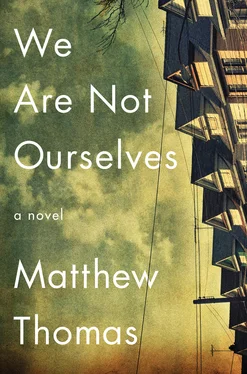“Just that the shirt I’m wearing happens not to have a back, and so I can’t take my jacket off.”
“Now why would a shirt not come with a back?”
“It’s cheaper this way,” his father said. “Less material.”
“I don’t think anyone here would have a problem with seeing your back,” Jack said with an odd edge in his voice. He turned to Frank McGuire. “Do you have a problem with seeing Ed’s back?”
Frank looked back and forth between Connell’s father and Jack, like he didn’t know what the right answer was. He broke into nervous laughter. “Come on, guys,” he said. “He wants to wear his jacket, he wants to wear his jacket. It’s Thanksgiving.”
“I realize he wants to wear his jacket, Frank. But I’m asking him to take it off. He’s making me nervous.”
“Is that what you want? You want me to take my jacket off?”
Jack was giving Connell’s father a hard look. Cindy, who had only belatedly caught on to the tension in the scene, as though it were occurring on a frequency only dogs could hear, put a hand on Jack’s arm in a silent plea.
“Yes,” Jack said. “That’s what I want.”
“Well, it is your house.”
“Last time I checked it still was.”
“Jack!” Cindy said.
Even Connell’s mother, who had been smiling at the outset, looked concerned. Connell wasn’t supposed to know what his parents both knew, which was that Jack’s airline was planning major cuts and Jack was worried about getting laid off. At night Connell stood in the darkened door of his room, listening down the hall to his mother on the phone in the kitchen.
“It’s okay, Cindy,” Connell’s father said. “This jacket is really bothering you, huh?”
“Nobody else has a jacket on.”
“Okay,” his father said, rising. “I understand. I’m sorry to have caused a disturbance.” He took one arm out of his jacket slowly, then the other. He had cut the entire rear panel from what looked like an expensive shirt. The sleeves clung to the shirt’s outline like windsocks in a strong gust. His skin was a blank, ridiculous canvas flecked by freckles and scraggly hairs. For a moment, the room seemed suspended in time.
“Is this what you wanted?” he asked. “To see this? Does this make you happy? Behold, then!”
Then Jack let out a bark of laughter so loud and sudden it could have been a death rattle; another followed to punctuate it; then his laughs came quick and plentiful, like the little skips a stone makes on the water’s surface after the first big few. The laughter was passed around the room like a contagion.
“Sit down at this goddamned table and eat some of my turkey, you goofy son of a bitch,” Jack said after he’d composed himself. The look on Jack’s face said he’d charge into battle for Connell’s father if he had to. Connell had seen people give his father that look before. Maybe you had to be an adult to really appreciate him.
That fall, he had made Connell do a project on habituation for the science fair. They tapped a bunch of roly-poly bugs a number of times with a pen. Some stopped rolling up quickly; the rest just kept getting annoyed. Eventually they all quit responding. This was supposed to be extremely significant, the fact that they could learn to ignore millions of years of inherited instincts after five minutes of pointless irritation. Connell gathered the data; his father helped him draw up the findings on a couple of poster boards — charts, graphs, everything low-tech. When he arrived at the auditorium, Connell knew he didn’t stand a chance. Other kids were setting up huge working volcanoes, radio-controlled cars, and full ecosystems with convoluted loops that ran the length of two tables. He didn’t even have a box full of bugs. When the teachers came around for the presentation, he started sweating. He explained the way they— he —had gone about it, as best as he understood it, which was less than he should have.
In awarding him first prize, they cited the project’s elegant simplicity and its careful application of the scientific method. Other parents hooted and hollered when their children’s names were announced. His father kept his seat and gave him a cool little nod and pumped his fist. Connell was never more impressed by him in his life. It was as if his father had known all along that they were playing a winning hand.
• • •
When his mother got home, she pulled him aside. “What was it like at Daddy’s school?” she asked. “How was he?” Her expression was strangely intense, and she was practically whispering. Connell was so unnerved that he almost said something. Then he remembered his promise.
“Dad was Dad,” he said. “I didn’t understand a word he was saying.”
An article in a nursing journal said that a fixed routine had a deleterious effect on the mind of a person prone to depression and that shaking up elements of a depressive’s environment could be a productive way to introduce treatment. She didn’t know for sure that Ed was technically depressed, but she knew she’d never be able to get him to a psychiatrist to find out.
What Ed needed — what they all needed — was to climb out of a rut. She started to wonder whether a move to another house might not be just the thing to jolt him out of his torpor. The timing was right: Connell was starting high school next year and could commute into the city from almost anywhere; the value of their home, given the encroaching neighborhood decay, would only go down. In a few years, they’d be trapped.
A house could make all the difference. Things improved for the Coakleys after Jack got promoted to director of cargo for SAS and they moved out to East Meadow. Jack had shown some signs of depression himself when they were still in Jackson Heights, but in East Meadow he started making furniture in his big garage and got into gardening and landscaping. He established an idyll in their backyard for all to enjoy: the echoing pool, the radio raised to drown out the rattle of distant mowers, wet footprints drying on hot concrete, the ubiquitous smell of sunblock.
It had been five years since she’d raised the rate on the already far-below-market rent she charged the Orlandos, and even then she’d raised it only a pittance. The knowledge that her son was safe had always offset in her mind the revenue she’d lost by floating the Orlando clan. Connell went up to one or the other of their apartments after school and stayed until she and Ed came home. Now that he was getting old enough to take care of himself, though, the protection they offered meant less than it once had.
“I’ve been thinking about this house,” she said. Connell was having dinner at Farshid’s, and they were alone at the dinner table. Ed didn’t respond. She’d gotten used to these one-sided exchanges. She’d learned to read different meanings into his silences. That night’s silence was auspicious; it lacked the heaviness of other varieties. It was like a sheet she could project her thoughts onto.
“I’ve been thinking that it might be nice to have a place of our own, where we don’t have renters. I’m tired of being a landlord. Aren’t you?” She filled a plate with chicken, potatoes, and steamed green beans and handed it back to him. It looked bland, but it was just the two of them, and Ed never seemed to care either way.
“This is our home,” he said.
“I know,” she said. “I was just thinking we could look for a place that would be… more ours.”
“We’ve done a lot of work on this house.” Ed cut into his chicken. Rather than cut a small bite, he sawed it in the middle until it was in two halves.
“You’re happy here?”
“I am.” He began cutting the halves in half, his head into his work.
Читать дальше
Конец ознакомительного отрывка
Купить книгу












